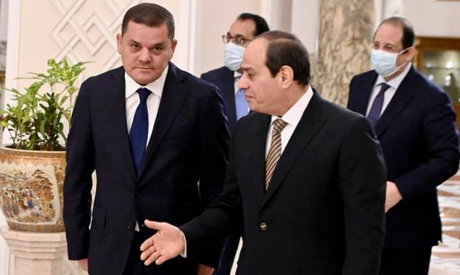
Paving the way for Libya’s elections
In the latest flurry of meetings in the evolving relationship between Egypt and Libya talks have covered a wide-range of political, security and economic issues.
On 14 September, President Abdel-Fattah Al-Sisi met with Speaker of the Libyan House of Representatives Aguila Saleh and the General Commander of the Libyan National Army (LNA) Khalifa Haftar. According to a statement released by the Egyptian presidency, the discussions focused on the latest political and security developments in Libya.
The Libyan political roadmap is at a crucial juncture, with the legislative and presidential elections scheduled for 24 December fast approaching. And now that Haftar has announced his intention to run for president, the elections have assumed significant military and security related dimensions. If Haftar does run, he will have to resign his military posts, and do so quickly given that recent legislation allows military officials to field themselves in the presidential polls on condition they resign three months ahead of the vote. Cairo is naturally concerned to know how Haftar’s border security functions will be fulfilled in his absence.
Meanwhile, the entire Libyan government visited Cairo last week. Prime Minister Abdel-Hamid Dabeiba arrived with 30 cabinet members for the second round of meetings of the Egyptian-Libyan Supreme Joint Committee. During the first meeting in April, the Egyptian prime minister headed Egypt’s delegation to Tripoli where a raft of bilateral agreements and memoranda of understanding were signed. They included executive agreements on major infrastructure projects such as the third Libyan ring road which will be built by a group of Egyptian contractors.
“Egypt will make a great contribution to Libyan reconstruction,” said Libyan Minister of State for the Economy Salama Al-Ghawil. “Egypt has the ability to get things done, and a majority of Libyans believes Cairo has no ambitions in Libya, unlike many other parties which are thirsting to get their hands on Libya’s wealth.”
Al-Ghawil estimated that Egypt is likely to have a $70 billion share in Libya’s reconstruction programme. According to Egyptian sources, Egyptian firms have already begun work on some projects after having received the go-ahead from the Egyptian government. The Egyptian and Libyan authorities, they say, see eye-to-eye on the urgency of completing essential infrastructure projects as quickly as possible.
The reconstruction drive dovetails neatly with Cairo’s vision for a comprehensive solution to the Libyan crisis. That solution consists of five pillars: the preservation of Libyan national unity and integrity; the belief that a political solution is the only viable path out of the crisis; the rehabilitation of Libyan national sovereignty and an end to foreign intervention in Libyan affairs, including the removal of all forms of foreign military presence and the dismantling of militias dependent on foreign support; the equitable distribution of national wealth among all sectors of the Libyan population, and an end to the bifurcation of government institutions.
Cairo wants Libya to be firmly on the path to stability and recovery after a decade of conflict and anarchy. While the forthcoming elections are a crucial step towards this end, they are only one part of a multidimensional process. Elections were, after all, held in Libya in 2012, only to serve as a prelude to polarisation and schism, and subsequent interim phase agreements, which in the end were not that different in substance to the current agreement, invariable broke down in their final phases.
Cairo has two basic concerns. The first is to prevent a collapse of the political process, not just before, but also after the elections. It is crucial for all parties to accept the results of the polls if Libya is to avert a repetition of the 2012 scenario.
The second concern relates to national security concerns and the impact on continued instability or, worse, military re-escalation in Libya.
Last week’s developments in Egyptian-Libyan relations cannot be divorced from the second round of exploratory talks between Egypt and Turkey earlier this month. Libya has been a central concern of both rounds, with Cairo insisting Ankara end its military presence in Libya and remove its mercenaries before bilateral relations are normalised.
There is considerable international support for Egypt’s position, which is consistent with the outputs of the Berlin Conference on Libya.
There is little doubt that Turkey has been involved in attempts to undermine the Libyan political process. According to a Libyan political figure who took part in the Libyan consultative dialogue sponsored by the Swiss-based Humanitarian Dialogue (HD) Centre last week, a group of Libyans scheduled to take part in the dialogue flew first to Ankara. While there they agreed to form a 26 member committee consisting of members of the House of Representatives (HoR) and the Higher Council of State (HCS) in order to rewrite the recently passed election law. Although the final statement of the consultative meeting stressed the need for the HoR and HCS to reach a consensus on the legislation, the participants rejected the proposals that had been brought from Turkey.
Not that this was the end of Turkish machinations. After the Geneva dialogue, the HCS persisted in its plan to produce an alternative to the election law recently passed by the HoR. The text, which has been submitted to the Supreme Electoral Commission, includes the stipulation that military figures who want to run for political office must resign two years ahead of the elections. The obvious purpose of this text is to exclude Haftar from running. Another provision, designed with Seif Al-Islam Gaddafi in mind, bans individuals who have had judicial sentences handed down against them or are wanted on criminal charges from running for high office. A source close to Gaddafi’s son described the HCS’ action as an attempt to politicise the law.
*A version of this article appears in print in the 23 September, 2021 edition of Al-Ahram Weekly
Short link: